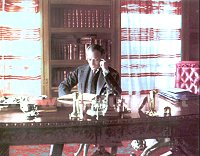Atatürks Life
"There are two Mustafa Kemals. One the flesh-and-blood Mustafa Kemal who now stands before you and who will pass away. the other is you, all of you here who will go to the far corners of our land to spread the ideals which must be defended with your lives if necessary. I stand for the nation's dreams, and my life's work is to make them come true!"

Atatürk stands as one of the world's few historic figures who dedicated their lives totally to their nations.
He was born in 1881 (probably in the spring) in Salonica, then an Ottoman city, now in Greece. His father Ali Riza, a customs official turned lumber merchant, died when Mustafa was still a boy. His mother Zubeyde, a devout and strong-willed woman, raised him and his sister. First enrolled in a traditional religious school, he soon switched to a modern school. In 1893, he entered a military high school where his mathematics teacher gave him the second name Kemal (meaning perfection) in recognition of young Mustafa's superior achievement. He was thereafter known as Mustafa Kemal.
In 1905, Mustafa Kemal graduated from the War Academy in Istanbul with the rank of Staff Captain. Posted in Damascus, he started with several colleagues, a clandestine society called "Homeland and Freedom" to fight against the Sultan's despotism. In 1908 he helped the group of officers who toppled the Sultan. Mustafa Kemal's career flourished as he won his heroism in the far corners of the Ottoman Empire, including Albania and Tripoli. He also briefly served as a staff officer in Salonica and Istanbul and as a military attache in Sofia.
In 1915, when Dardanelles campaign was launched, Colonel Mustafa Kemal became a national hero by winning successive victories and finally repelling the invaders. Promoted to general in 1916, at age 35, he liberated two major provinces in eastern Turkey that year. In the next two years, he served as commander of several Ottoman armies in Palestine, Aleppo, and elsewhere, achieving another major victory by stopping the enemy advance at Aleppo.
On May 19, 1919, Mustafa Kemal Pasha landed in the Black Sea port of Samsun to start the War of Independence. In defiance of the Sultan's government, he rallied a liberation army in Anatolia and convened the Congress of Erzurum and Sivas which established the basis for the new national effort under his leadership. On April 23, 1920, the Grand National Assembly was inaugurated. Mustafa Kemal Pasha was elected to its Presidency. Fighting on many fronts, he led his forces to victory against rebels and invading armies. Following the Turkish triumph at the two major battles at Inonu in Western Turkey, the Grand National Assembly conferred on Mustafa Kemal Pasha the title of Commander-in-Chief with the rank of Marshal. At the end of August 1922, the Turkish armies won their ultimate victory. Within a few weeks, the Turkish mainland was completely liberated, the armistice signed, and the rule of the Ottoman dynasty abolished.
In July 1923, the national government signed the Lausanne Treaty with Great Britain, France, Greece, Italy, and others. In mid-October, Ankara became the capital of the new Turkish State. On October 29, the Republic was proclaimed and Mustafa Kemal Pasha was unanimously elected President of the Republic.
Atatürk married Latife Usakligil in early 1923. The marriage ended in divorce in 1925. The account of Atatürk's fifteen year Presidency is a saga of dramatic modernization. With indefatigable determination, he created a new political and legal system, abolished the Caliphate and made both government and education secular, gave equal rights to women, changed the alphabet and the attire, and advanced the arts and the sciences, agriculture and industry.
In 1934, when the surname law was adopted, the national parliament gave him the name "Atatürk" (Father of the Turks).
On November 10, 1938, following an illness of a few months, the national liberator and the Father of modern Turkey died. But his legacy to his people and to the world endures.
Atatürk's body was re-interred in this splendid mausoleum in 1953.

